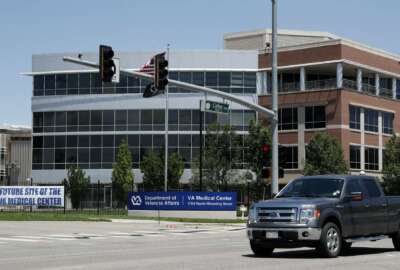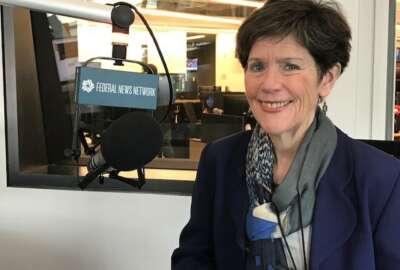
Staff at VHA take stock as the agency celebrates 75 year of history
Veterans and health care have changed a lot since 1945 when the vast cohort started returning home from World War II. The VA's acting Undersecretary for Health,...
Best listening experience is on Chrome, Firefox or Safari. Subscribe to Federal Drive’s daily audio interviews on Apple Podcasts or PodcastOne.
The Veterans Health Administration is marking 75 years as an agency, first within the Veterans Administration, and now in the Department of Veterans Affairs. Veterans and health care have changed a lot since 1945 when the vast cohort started returning home from World War II. The VA’s acting Undersecretary for Health, Dr. Richard Stone, joined Federal Drive with Tom Temin for a review.
Interview transcript:
Tom Temin: Dr. Stone, good to have you on.
Richard Stone: Tom, thanks so much for having me. I appreciate it. It’s nice to be with you again.
Tom Temin: And you do bring a, kind of a good perspective on this having been 23 years in the Army. So you’re a veteran. So you are a recipient of VHA’s services, I presume, and also someone who on a couple of occasions has helped and overseen the delivery of it. What should we think about after 75 years as an agency?
Richard Stone: Well, thank you, Tom, I tell you, I am a combat veteran, I do get my services from the VA. So I’ve been a recipient, and I’m really proud to lead the organization’s health delivery system at this point. You know, at the end of World War II, the nation recognized the fact that there was over 18 million veterans coming home from World War II from around the world. They needed services and the country was convinced that this should be really high level services connected to the academic medical centers in the nation. And therefore, when Omar Bradley was given control of the agency, and he brought in Dr. Paul Hawley, who was his lead clinician who had led the medical aspect of the war in Europe for over four years, they began the process of really associating the VA with major academic medical centers around the country. And it’s been an extraordinary story of innovation and creativity ever since. And as we celebrate the 75 years, it’s really that foundation that Omar Bradley and Dr. Hawley laid out that got us on the road to what’s now 1,700 academic affiliations, 70% of America’s doctors being trained in VA hospitals, and that innovation and creativity has continued even through this pandemic.
Tom Temin: And of course, the specific medical issues of returnees from World War II, and then fast forward ahead to the Vietnam era. And now the Iraq-Afghanistan era, and all those different spots in between – the specific medical issues have changed, in some sense, as field medicine has gotten better, too. So VA has been able to adapt, it seems would you say?
Richard Stone: I think it has, you know, one of the first great advances of the VA was blind rehabilitation, which didn’t exist in the world before the VA. And we designed it and in 1946, it really rolled out the first blind rehabilitation. Prosthetic work was done at that time. People don’t recognize that mental health issues from World War II were extraordinary. In fact, in 1947, there was over 95,000 veterans that were hospitalized in VA hospitals for mental health related issues related to their combat. Remember that veterans at that time went off at the beginning of the war and stayed till the end of the war, till the really declaration of victory and the capitulation of the enemy. They came home four and five years later, it is different now. Our Vietnam veterans went off for 13 months to a very unique experience. And we’ve all talked about various exposures that that veteran had, and the reception of that veteran, or that era of veteran back into the United States was much different than what I experienced as an Afghanistan veteran.
Tom Temin: And of course, the VA has had to, I guess, adapt and also steer a path between competing interests over the years. For example, if you look at the Blue Water issue that’s been happening with the Vietnam Blue Water veterans – Agent Orange before that – sometimes the veterans and their advocates who are aware of issues before the VHA, in some cases had the statutory authority to deal with them. So that’s been a tough road also, at times.
Richard Stone: It has and with each war, we experienced something different. And it is not a surprise to you. If I say I just recorded a outreach to 3 million Afghanistan and Iraq War Veterans for burn pit exposure and particulate matter in the air. We recognized when we were in Afghanistan that even the children in Afghanistan had significant respiratory difficulties due to particulate matter in the air. And the veteran is no different than that. And as we work our way through the science of this, it can be difficult, it can be frustrating and our job is to be as welcoming as we can to have veterans come in to us and work our way through the research. You know, we have in the 1,700 academic affiliations we have research going on in multiple areas and spend well over a $1.5 billion a year on research studies. Over 7,000 academic research studies are ongoing today in everything from precision oncology, to the Million Veteran genomic program, to work on burn pits and particulate matter exposure, as well as continuing work in our Agent Orange population.
Tom Temin: We’re speaking with Dr. Richard Stone. He’s acting Undersecretary for Health at the Veterans Health Administration within the VA. And how would you assess the VA’s inculcation of the women’s health issues. As the number of female veterans has steadily risen over the decades?
Richard Stone: I would tell you that the most rapidly growing portion of our population are female veterans. They are coming to us in large numbers, and they’re staying with us. And they consume health care at a higher rate than many of our male veterans. And so we have continued to strengthen our systems in both unique clinics for the female veteran if she should desire it, as well as making sure that we’re a welcoming place for this. And this can still be a male dominant organization at times. And we’re working hard to reverse that and change that and making sure that this is as welcoming a place as possibly could be for a female veteran who, frankly, just like the male has earned the benefits that she deserves.
Tom Temin: And you mentioned rehabilitation of the blind and development of leading edge prosthetics. Any other milestones that you can think of that VA has pioneered in these decades?
Richard Stone: There is – we were the originator of the CT scanner. And we were the originators of the first implantable cardiac pacemaker. The first liver transplant – we virtually eradicated Hepatitis C through aggressive work with Hepatitis C therapy. The nicotine patch – in the 1960s, it was the VA that first recognized the association between lung cancer and smoking and worked with the surgeon general the United States to really bring that forward. And it was in the 1980s, that we came out with the nicotine patch. Three Nobel Prizes have been awarded to VA researchers over the years, everything from brain peptides that go into how the endocrine system works to chemicals that keep blood vessels, flexible and prevent stroke, and heart attack – are all things that we’ve worked on. And so it’s a long history of innovation. It’s a history of innovation that goes on even today in our 3D printing and some of the work that we continue to do on genomic portions of the Million Veteran Program.
Tom Temin: And when an organization is that big with more than 300,000 people, and many, many health care providers directly, what’s the secret sauce for making sure that everyone stays on mission? Because bureaucracies can sort of start to serve themselves if you’re not careful, and that those people on the front line maintain the level of quality that the VA hopes to have for itself?
Richard Stone: I think the the main issue is, in any high reliable organization is deference to frontline expertise. And the frontline experts in this organization are extraordinary. And it’s why 90% of veterans recommend VA health care to other veterans. It’s an extraordinary advance in the work that we’ve done in the last six or seven years that have brought this organization to level it was. It’s why we’ve been so agile and successful in the COVID pandemic. And in our ability to get vaccine out. You know, the exciting news today is that we will go over 1 million doses of vaccine delivered to America’s veterans and to our employees today. And so it’s an exciting time. It’s a time of innovation that began 75 years ago, and is continued in the same manner. But it’s deference to frontline expertise. That really is why we’ve done so well.
Tom Temin: And looking to the future. What do you think the next set of challenges will be for the VHA?
Richard Stone: Well, the aging of the American veteran population results in unique needs and complex comorbid conditions of not only their service, but of diseases that are more common in veterans. As we look at that, the concept of veterans’ ability to choose home over institutionalization, as many of our nonveteran citizens have had to do, is something we’re very, very proud of. The genomic work we’re doing – you know, not many people recognize that the VA is the largest provider of cancer services in the nation. More than 50,000 veterans are being treated for cancer in VA institutions. And so much of our precision oncology work that is done in cooperation with many of our academic colleagues and academic medical centers, is one in which we’re working really hard to bring to every veteran no matter where they live, the benefits of precision oncology and genomic work that allows us to do unique therapies to them, which raises the ability to deliver potential cures and remissions of their cancers. But it’s that type of work that I think will continue to occupy much of our attention as we go forward into the future, and to assure the American veteran and the American people that we will continue to fulfill our responsibilities to those who have defended this constitution and defended the nation.
Tom Temin: Dr. Richard Stone is acting Undersecretary for Health at the Veterans Health Administration. Thanks so much for joining me.
Richard Stone: Tom. Thanks so much for having us. Anybody that wants additional information can call their local VA Medical Center or get on the website of the VA Medical Center to get additional information.
Tom Temin: And this is one in a series of interviews to mark the agency’s 75th anniversary. We’ll post this interview with FederalNewsNetwork.com/FederalDrive. Hear the Federal Drive on demand. Subscribe at Podcastone or wherever you get your shows.
Copyright © 2024 Federal News Network. All rights reserved. This website is not intended for users located within the European Economic Area.
Tom Temin is host of the Federal Drive and has been providing insight on federal technology and management issues for more than 30 years.
Follow @tteminWFED
Related Stories





